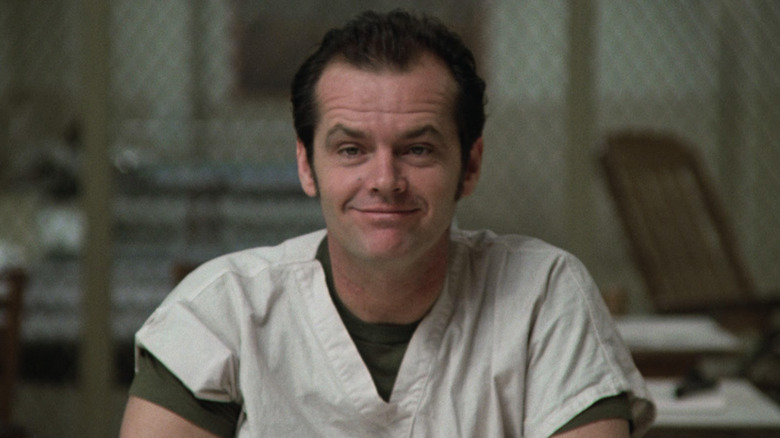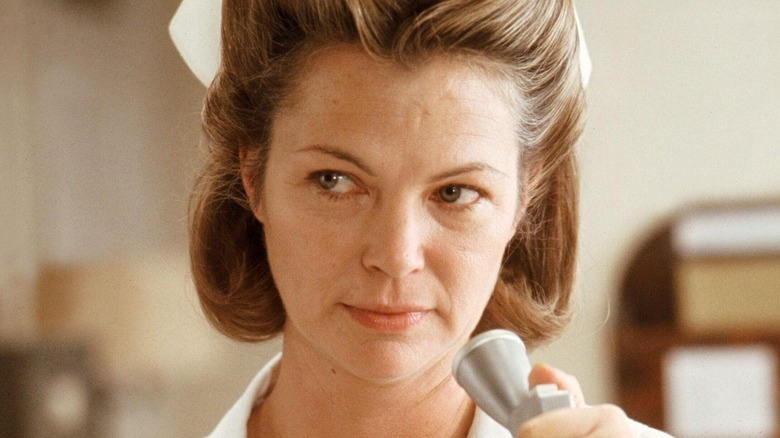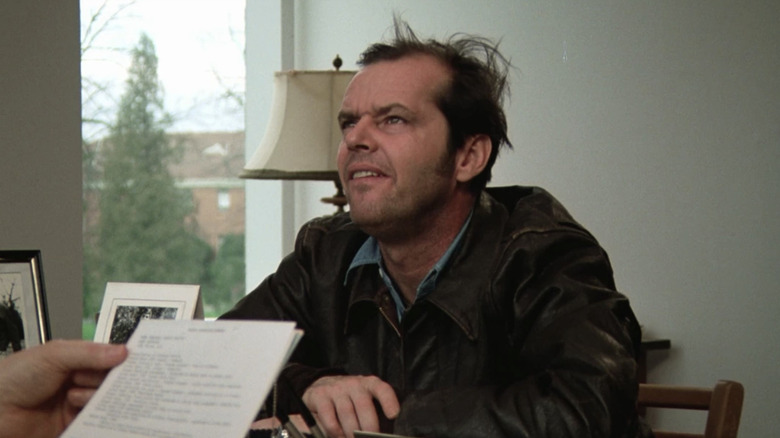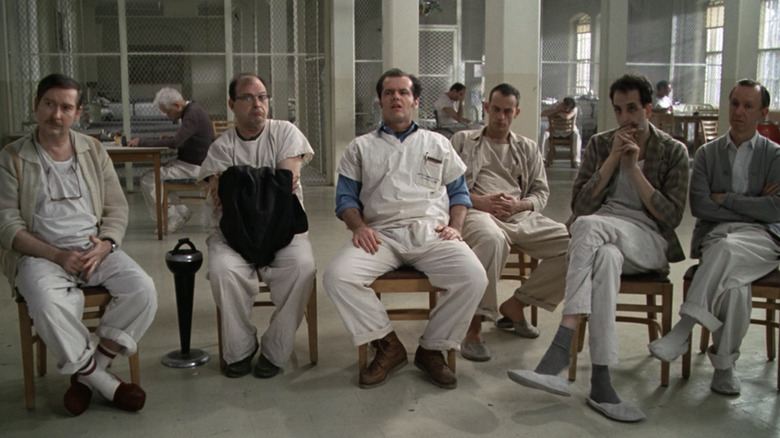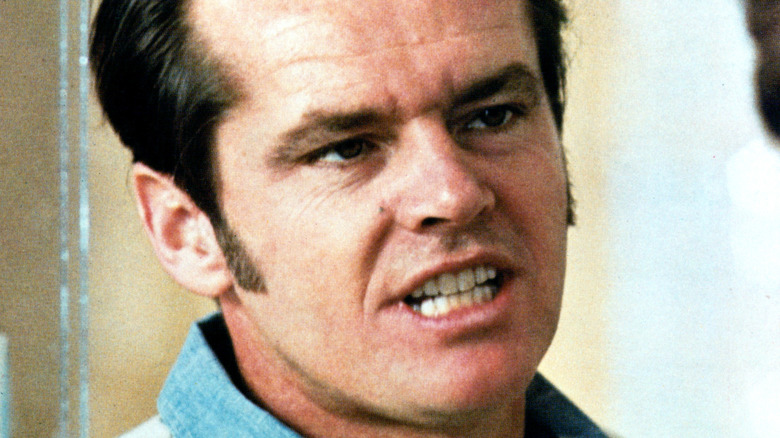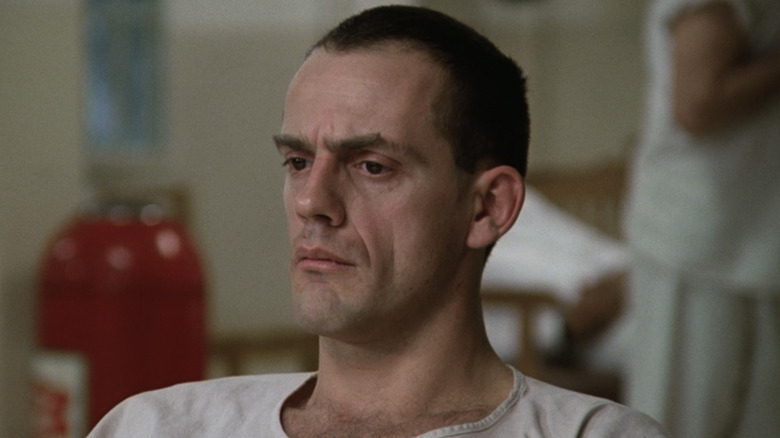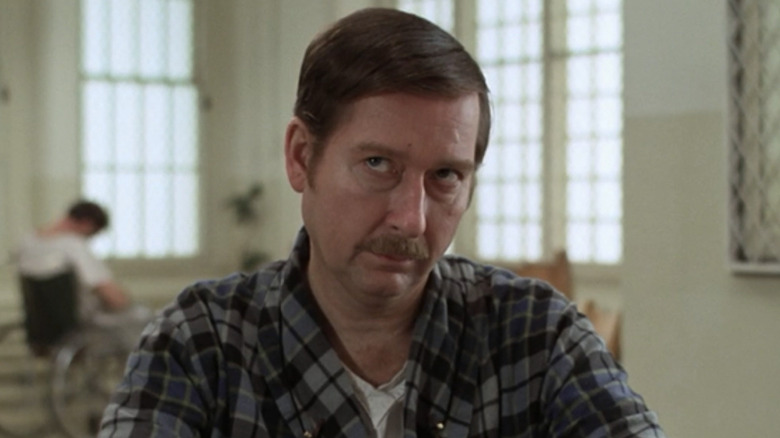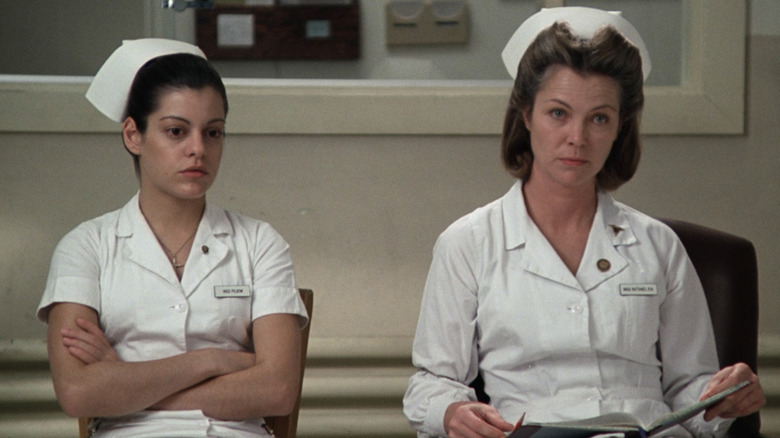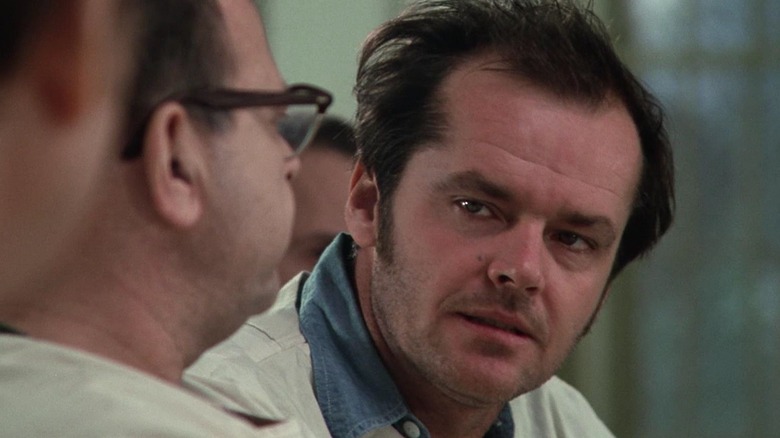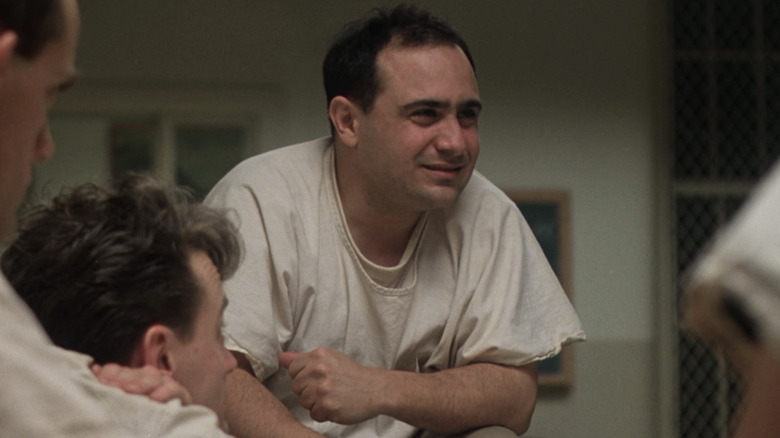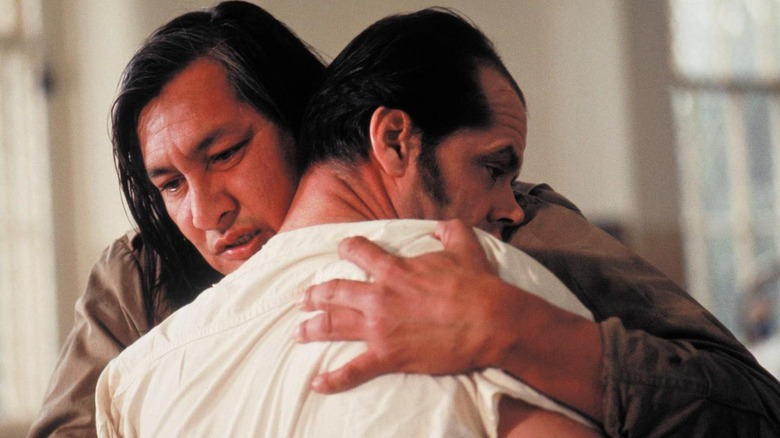One Flew Over The Cuckoo's Nest: 10 Facts Only Huge Fans Know About The Jack Nicholson Classic
When it comes to award-winning movies that everyone deserves to see at least once, few are as impressive as "One Flew Over the Cuckoo's Nest." Miloš Forman's 1975 classic takes Ken Kesey's beloved 1962 novel of the same name and brings the story to the next level with a star-studded cast.
"One Flew Over the Cuckoo's Nest" centers around Randle McMurphy (Jack Nicholson), who pretends to be insane in order to get sent to a mental institution rather than prison for his crimes. He quickly gets caught in the web of authoritarian caretaker Nurse Ratched (Louise Fletcher), who systematically tortures the patients in her care. The film follows the cat-and-mouse exploits of McMurphy as he undermines Ratched at every turn, and builds relationships with his fellow patients along the way.
This critically acclaimed film has stood the test of time thanks to its compelling story, steady direction, and stunning performances. In fact, "One Flew Over the Cuckoo's Nest" is ranked No. 33 on AFI's 100 Years...100 Movies list of the best American movies ever made, just behind "The Godfather Part II" and just after "Snow White and the Seven Dwarfs." Although by now this film has firmly cemented its place in culture, there may be a lot you don't know about how it came to be. Read on to learn all the facts that only huge fans know about this Jack Nicholson classic.
Louis Fletcher flashed her co-stars
AFI's 100 Years...100 Heroes and Villains named Nurse Ratched is the fifth greatest villain of all time and actress Louise Fletcher found herself getting perhaps too closely aligned with her unlikeable character. As Fletcher joked in her best actress Oscar speech for the role, the film's male actors' "professionalism, humor and capacity for getting into their roles made being in a mental institution like being in a mental institution."
Fletcher explained to Express that she wanted to remain professional and maintain a connection to her character as the antagonist, so she avoided partying with Nicholson and the others during production. It was hard to do, since the cast was all staying in the same place and often went out at night. So, Fletcher lied to the producers about a stranger bothering her at her accommodations so she could stay somewhere else. She said, "I desperately wanted to be on my own, to have the separation that I thought was so important for the role."
Fletcher's desire to stay separate from the others backfired, as she soon found herself too isolated from her castmates. Unlike her on-screen counterpart, Fletcher dug into her humorous side to build camaraderie with her co-stars by unexpectedly taking off her clothes on set. She told Express, "I'll show them I'm a real woman under here, you know.' I think that must have been what I was thinking."
Fletcher elaborated to The Guardian that she got "sick of all the constrictions to do with playing Nurse Ratched," so she decided to give the cast a special goodbye gift: She had the set photographer take a picture of her topless in her nurse's cap, posing like Betty Grable, which she signed for her co-stars.
It won the Big Five Oscars
While many consider getting an Oscar to be the highest achievement and spend their careers trying to get one, there's an even more exclusive tier of critical acclaim that only a handful of movies have reached. We're talking about getting the "Big Five" at the Academy Awards: best picture, best director, best actor, best actress, and best screenplay.
"One Flew Over the Cuckoo's Nest" is one of the few movies to ever receive this honor, which it did during the 48th Academy Awards ceremony in 1976 (via Gold Derby). The film netted Oscars for Miloš Forman, Jack Nicholson, Louis Fletcher, and screenwriters Lawrence Hauben and Bo Goldman across all the major categories for which they were nominated.
It was only the second film to ever pull this feat off and did so over 40 years after Frank Capra's 1934 romantic comedy "It Happened One Night" first achieved this milestone. A Big Five sweep didn't happen again until 1992 with Jonathan Demme's "The Silence of the Lambs" and to date, these are the only three movies to hold this honor.
The author of the book hated the movie
It's not unusual for authors to have mixed opinions about their writing being adapted to film since they're totally different mediums. Many things can be lost in the translation from the page to the screen that goes unnoticed by the average viewer but can unsettle creators. Unfortunately, that seems to be exactly what happened in the case of "One Flew Over the Cuckoo's Nest" author Ken Kesey.
Kesey joined the ranks of writers like Stephen King, Bret Easton Ellis, and Margaret Atwood by condemning the filmed adaptation of their famous pieces of literature as being insufficient reinterpretations of their stories (via IndieWire). Kesey flat out refused to even see Forman's film because of creative differences that developed during production. Producer Michael Douglas told IndieWire that these stemmed in part from Kesey being asked to adapt his novel into the screenplay, which wasn't used in the end.
Kesey had another explanation, as he told NPR that his intentions differed from what the film crew wanted. Kesey said, "I really wrote it to be as weird as I thought being in the nuthouse was, but it was not what they wanted. I was naïve at the time. I wanted to do 'The Cabinet of Dr. Caligari', and they wanted to do 'Hogan's Heroes.'" He also expressed disappointment that unlike the novel, the film isn't told from Chief's perspective.
Jack Nicholson wasn't the first choice for McMurphy
While it may be hard to imagine anybody playing the role of McMurphy other than Jack Nicholson, that's almost what happened. Despite his standing as one of the best actors of his generation, he still wasn't the first choice for the leading role of "One Flew Over the Cuckoo's Nest."
Bringing "One Flew Over the Cuckoo's Nest" to the big screen began with Hollywood legend Kirk Douglas. After starring as Randle McMurphy in the Broadway version of Kesey's novel (via Broadway.com), the "Spartacus" actor nabbed the film rights and spent considerable energy trying to turn it into a movie with him in the leading role. He struggled to get it made and finally agreed to let his son Michael Douglas — then a mostly unknown actor — take the film's producing rights (via Deadline).
Michael Douglas talked about making the film on The Late Show with Stephen Colbert, explaining that despite his father's insistence on starring as McMurphy, director Miloš Forman felt that he was far too old for the part. It became a "bone of contention" between the Douglases, as Kirk blamed his son for this, even though it was the director's choice.
According to The Independent, Forman and Michael Douglas wanted Marlon Brando or Burt Reynolds to play McMurphy, while Ken Kesey's top choice was Gene Hackman. After Brando and Hackman turned the role down, Jack Nicholson's name came up, which clicked for Douglas, who noted in 2015 that "when I saw him as the flamboyant but sensitive shore patrol-man in 'The Last Detail,' I knew he could play the part" (via The Independent).
It was the film debut of Christopher Lloyd
Jack Nicholson isn't the only star of "One Flew Over the Cuckoo's Nest," as the film features an incredible ensemble cast of character actors in supporting roles like Danny DeVito, Will Sampson, and Brad Dourif as various mental patients and staff. One actor who is almost certainly a familiar face is Christopher Lloyd, who played the role of the patient Max Taber in the mental institution.
While Lloyd went on to become a household name thanks to his performance as eccentric scientist Doc Brown in the "Back to the Future" franchise, his turn in "One Flew Over the Cuckoo's Nest" marked his film debut ten years before he introduced the world to his time-traveling DeLorean.
During an interview with The AV Club, Lloyd touched on his feelings about starring alongside Nicholson for his big break. He said, "It was my first film, and I was going to be with Jack Nicholson, who was already an idol for me with all the work he'd done up to that point. ... to be working with Miloš Forman and Jack Nicholson was so exciting for me." Interestingly, Christopher Lloyd and co-star Danny DeVito continued their working relationship a few years later in 1978 by leading the ABC sitcom "Taxi' as Louie and Iggy.
William Redfield received a terminal diagnosis while filming
One of the sadder stories to come out of "One Flew Over the Cuckoo's Nest" is the experience of actor William Redfield, who played Dale Harding, the articulate, analytical patient struggling with his sexuality. Redfield was an incredibly talented actor, who had previously starred in films like "Fantastic Voyage," "A New Leaf," and "Death Wish" before his appearance alongside Jack Nicholson in 1975.
Miloš Forman sought to make the film as real as possible by having actors audition in a group therapy setting, filming at an actual mental health hospital in Oregon, and even casting the head of that hospital — Dr. Dean Brooks — in the film as the character Dr. Spivey (via The Guardian). According to The Guardian, Brooks noticed the telltale symptoms of leukemia while working with Redfield and was able to diagnose the actor on-set.
Redfield decided to keep this information private throughout filming and sadly, passed away just 18 months after the release of "One Flew Over the Cuckoo's Nest" (via The New York Times).
Redfield is remembered fondly for his poignant scene in "One Flew Over the Cuckoo's Nest" where he rants about the nature of existence by saying, "I'm not just talking about my wife, I'm talking about my life... I'm talking about everybody! I'm talking about form, I'm talking about content, I'm talking about interrelationships!"
It made a lot of money at the box office
Pop culture today is completely dominated by big budget blockbusters like superhero movies and established franchises, so can be hard to imagine a time where something like "One Flew Over the Cuckoo's Nest" could actually be a huge financial hit. But that's exactly what happened upon its release back in 1975.
Miloš Forman's adaptation of "One Flew Over the Cuckoo's Nest" was a critical hit as seen by the amount of awards it garnered and it was equally successful financially. In fact, the film was the second highest-grossing feature of 1975, just behind "Jaws" (via The Numbers), which is especially impressive since "Jaws" was the first summer blockbuster (via IndieWire). In the end, "One Flew Over the Cuckoo's Nest" made nearly $109,000,000 worldwide (via The Numbers).
Roger Ebert revisited the film in 2003, noting that he went to the movie's world premiere and "have never heard a more tumultuous reception for a film (no, not even during "E.T. The Extra-Terrestrial" at Cannes)." Clearly, audiences were as enthusiastic about the film as critics and the film's box office returns prove it.
Jack Nicholson had a different take on his character
It's not unusual for actors to find deeper meaning, subtext, and nuance of a role beyond what the filmmakers originally intended. So it was with Jack Nicholson, who ended up having a unique take on his character that was all his own, which differed from the source material. Ken Kesey's novel tells the story of a rebellious and selfish man, who's at odds with the system and figure of authority denying him the chance to just do what he wants.
Certainly, there are elements of that in Nicholson's portrayal of Randle McMurphy, but Nicholson explained to The New York Times in 1986 that he decided to infuse McMurphy with motivations beyond just an anti-authoritarian defiance. Nicholson noted that his approach with every role is the find the secret of the character, which is at the heart of everything they do: "The secret to 'Cuckoo's Nest' — and it's not in the book — my secret design for it was that this guy's a scamp who knows he's irresistible to women and in reality he expects Nurse Ratched to be seduced by him. This is his tragic flaw."
He continued to say that the only person he revealed this secret to was Louise Fletcher, since it was important for her to understand his dynamic with Nurse Ratched, and that ultimately, "it was one long, unsuccessful seduction which the guy was so pathologically sure of.”
Danny DeVito was the first to be cast
While these days, Danny DeVito is mostly famous as the deranged father figure Frank Reynolds on "It's Always Sunny in Philadelphia," he has had a long history of standout roles over his six decades in the entertainment industry. Some of his most notable projects include "Hercules," "Matilda," "Batman Returns," "Taxi," and of course, "One Flew Over the Cuckoo's Nest."
DeVito's history with "One Flew Over the Cuckoo's Nest" began in 1971 when he played the role of Martini in the off-Broadway version of Kesey's book (via Circle Players). Thanks to his familiarity with the part, as well as his friendship with producer Michael Douglas, he was the first to get cast in the film. Douglas explained to The Guardian that DeVito was not only his roommate in the 1960s, but was also one of his oldest friends, so he was the first person that Douglas brought onto the movie.
After deciding to move ahead with Jack Nicholson but then getting delayed for several month because of his schedule, Douglas focused on getting the ensemble cast just right instead. It seems like starting with DeVito helped him set the tone to find the best people to fill out the hospital.
Milos Forman and Jack Nicholson fought a lot
While so much of "One Flew Over the Cuckoo's Nest" works on-screen, things didn't work so well behind the scenes, as Jack Nicholson and director Miloš Forman found themselves at odds throughout the shoot. While fighting between directors and actors isn't totally uncommon, it seems as though the tension rose to unacceptable levels between these two critical parts of "One Flew Over the Cuckoo's Nest."
One of the biggest issues that drove a wedge between the two was Forman's refusal to show the actors their dailies or the unedited footage of their performances, which can help actors make adjustments. Producer Michael Douglas told The Guardian that "the cast was beginning to lose a little confidence in Miloš" because he wouldn't let them see their dailies, which left them wondering about their performances. Although Douglas convinced Forman to show them the footage, things just got worse between the director and Nicholson.
In fact, it got to the point that Nicholson stopped speaking to Forman completely and instead, the two only spoke to each other through cinematographer Bill Butler (via World Cinema Paradise). Actor William Redfield told the film's production designer Paul Sylbert that "Jack has taken over directing the actors" and was leading secret rehearsals with the cast (via World Cinema Paradise). The star had totally lost faith in Forman's abilities after seeing Dr. Brooks, the head of Oregon State Hospital, harshly criticize Forman's representation of a mental institution, and Nicholson refused to speak to Forman directly afterwards.
Against all odds, "One Flew Over the Cuckoo's Nest" did get finished and earned the critical acclaim it deserved despite some serious production hurdles.
